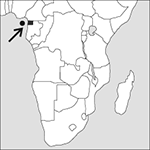
Source: MAPS IN MINUTES™ © RH Publications (1997)
Capital:
Malabo
Area:
28,051 sq km (10,831 sq miles)
Population:
704,001 (2013 est)
Currency:
1 CFA franc = 100 centimes
Religions:
Roman Catholic 87.0%; other Christian 6.0%; traditional beliefs 5.0%
Ethnic Groups:
Fang 85.7%; Bubi 6.5%; Mdowe 3.6%
Languages:
Spanish, French (both official); Fang, Bubi, and local languages
International Organizations:
UN; AU; Non-Aligned Movement; Franc Zone
A small country in equatorial West Africa on the Gulf of Guinea.
Physical
Equatorial Guinea includes the plateau of Río Muni bounded by Cameroon and Gabon, and the more mountainous and fertile, but smaller, island of Bioko (Fernando Póo).
Economy
The exploitation of offshore oil generated rapid economic growth in the early 2000s, and Equatorial Guinea’s economy now relies on oil production and export. Subsistence farming is the main occupation, but the agricultural sector has been neglected. There are deposits of gold, iron ore, copper, manganese, uranium, silica, and titanium.
History
Formerly a Spanish colony, it was a haunt of slave-traders and merchants. The mainland was not effectively occupied by Spain until 1926. Declared independent in 1968, a reign of terror followed until President Macias Nguema was overthrown and executed (1979) by his nephew, Obiang Nguema. The new regime pursued less repressive domestic policies with some degree of success. A referendum in November 1991 appeared to give overwhelming approval for multiparty politics, and in January 1992 an amnesty was granted by President Obiang to returning exiles; but in February a number of opposition leaders were arrested and some later died in prison. Multiparty elections were planned, but opposition parties claimed they were not allowed to campaign freely. Few people voted in the 1993 elections, which were reported as being unfair by international observers. Obiang's ruling party officially won and remained in power, as it has done in subsequent elections, most recently in 2016. In 1995 the UN reiterated its concern about serious violations of human rights in the country, and suppression of any opposition continues. Obiang and his family have amassed great wealth from the oil resources of the country, but most of the population live in great poverty.
- Universal Time
- Universal Time Coordinated
- Universal Transverse Mercator
- universal Turing machine
- Universe
- universe
- universe of discourse
- Universities Space Research Association
- University International Formation Mission-1
- univibrator
- univocal
- UNIX
- unknot
- unknown
- unknown host
- unlimited liability
- Unlisted Securities Market
- unloading
- unloading joint
- unlock
- unmarshalling
- unmoderated newsgroup
- unmoved mover
- unnil-
- unofficial economy